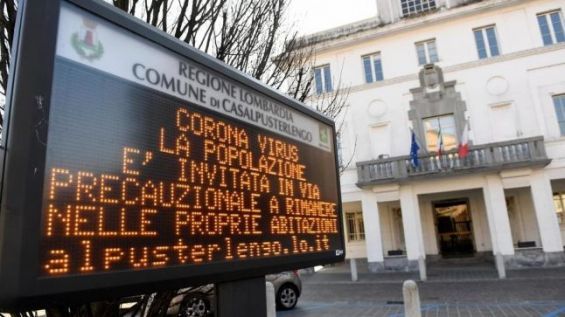As China is battling the spread of the new coronavirus, Italy has announced more than 150 cases in the densely populated region around Milan. On Sunday, authorities in the European country announced that at least 10 villages have been locked down to curb the spread of the virus.
Meanwhile, several schools and universities have been closed while cultural and sports events have been canceled in several areas, including Venice, which was expected to host on Tuesday an annual carnival.
Following the preventive measures announced by the Italian authorities, the Moroccan consulate in Verona, a city in northern Italy, announced the establishment of a crisis cell to assist Moroccans living in the area.
In a statement sent, Sunday, to the presidents of Islamic associations and centers in Italy, the consulate explained that this cell was set up after health authorities announced that the country is witnessing the worst outbreak of the coronavirus in Europe.
Moroccans in Verona, Milan and Bologna
In Verona, Achraf Ali, the president of the city’s Islamic Center told Yabiladi, Monday, that there «is only one reported coronavirus case» in the commune. «The measures announced by the authorities on Sunday are just preventive to avoid the spread of the virus», Ali explained.
«Gatherings, especially in stadiums, churches, mosques and synagogues are not recommended», he revealed, adding that the center he heads «was closed following the orders of the authorities».
A Moroccan who lives in Milan confirmed the same thing. Speaking to Yabiladi on Monday, he said that all «gatherings have been avoided» to manage the outbreak. Mosques, churches and synagogues have also been closed as part of a measure that is «not discriminative».
However, the Milan-based Moroccan said that «supermarkets were emptied yesterday». «A store in Milan sold all the food it had by 3 pm. People should avoid this kind of behavior and avoid panicking», the same source argued.
In Bologna, Adil Asri, a Moroccan who heads a workers’ association in the city, said that «schools, universities were also closed in the city while activities were also canceled like in other cities».
«The Italian government has released several statement communiques about the virus» and «we trust them», he explained.
As for the Moroccan community in Bologna, Asri said that for the moment he «[has] not heard of any Moroccan who wants to leave for Morocco amid the outbreak».
Moroccans in Treviso and Somaglia
Meanwhile in Treviso, a city near Venice, Moroccan national Abdallah Khazraji said that «Moroccans are scared of the outbreak, especially as media and newspapers say that it is the worst in Europe so far».
However, Khazraji said that he «cannot avoid going out as [he] has to work». «We are close to Austria and the authorities there have denied entry to a train coming from Italy. Countries surrounding Italy are also taking preventive measures to avoid the spread of the virus», he reported.
Abdelkrim Al Merdadi, a Moroccan who lives in one of the quarantined communes near Milan, told Yabiladi, Monday, that «the first coronavirus case was discovered 100 meters away from where [he] lives».
«I am in the Somaglia commune, which is a small village with 4,000 inhabitants. We are under quarantine and no one is allowed to leave the town as we have been informed yesterday», Al Merdadi said.
«Supermarkets have closed their doors and we have to travel to fetch food while some products have already been out of stock», the Moroccan reported. Like the rest of the town’s inhabitants, Al Merdadi is not allowed to go to work.
«We trust the Italian authorities and believe that they will do what is necessary. I think the military will be responsible for the transportation of food», he said, adding that just like other regions, «places of worship have been closed and events were canceled».





 chargement...
chargement...













